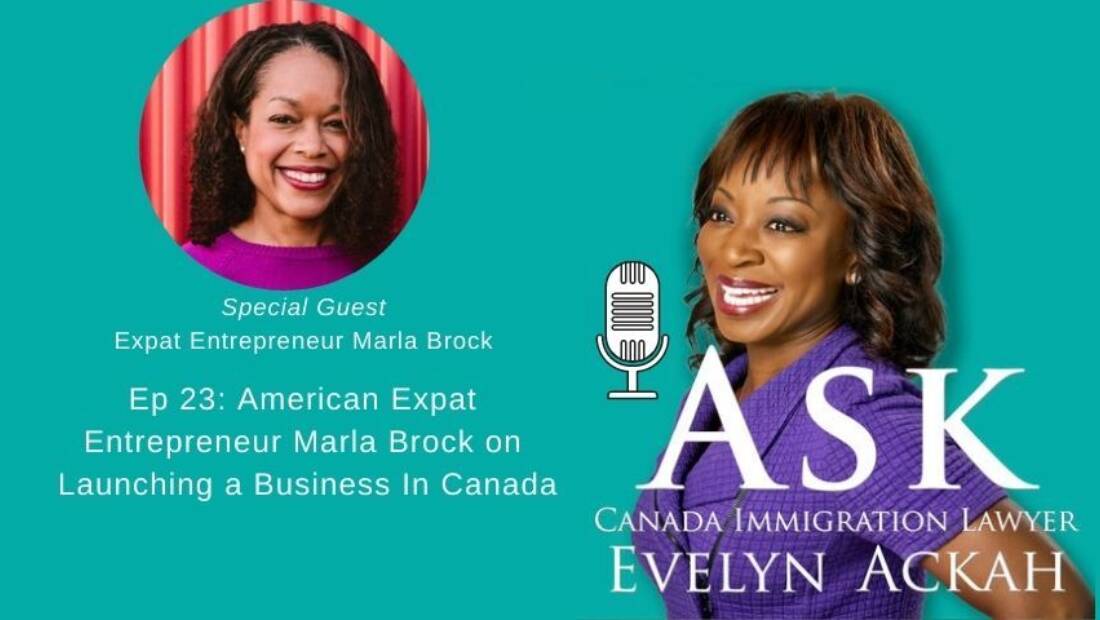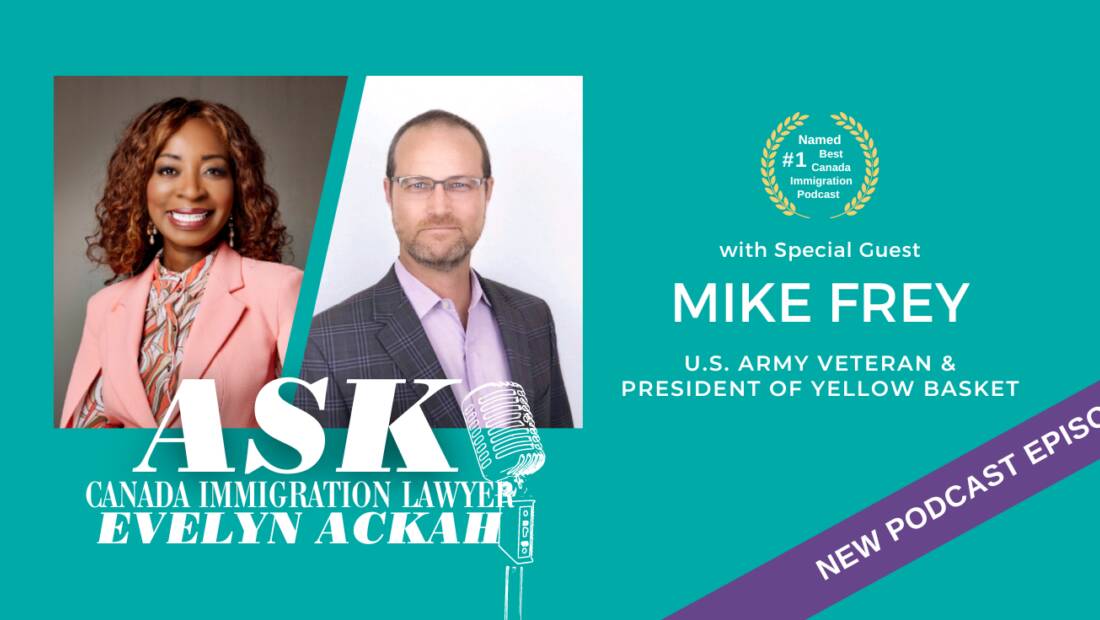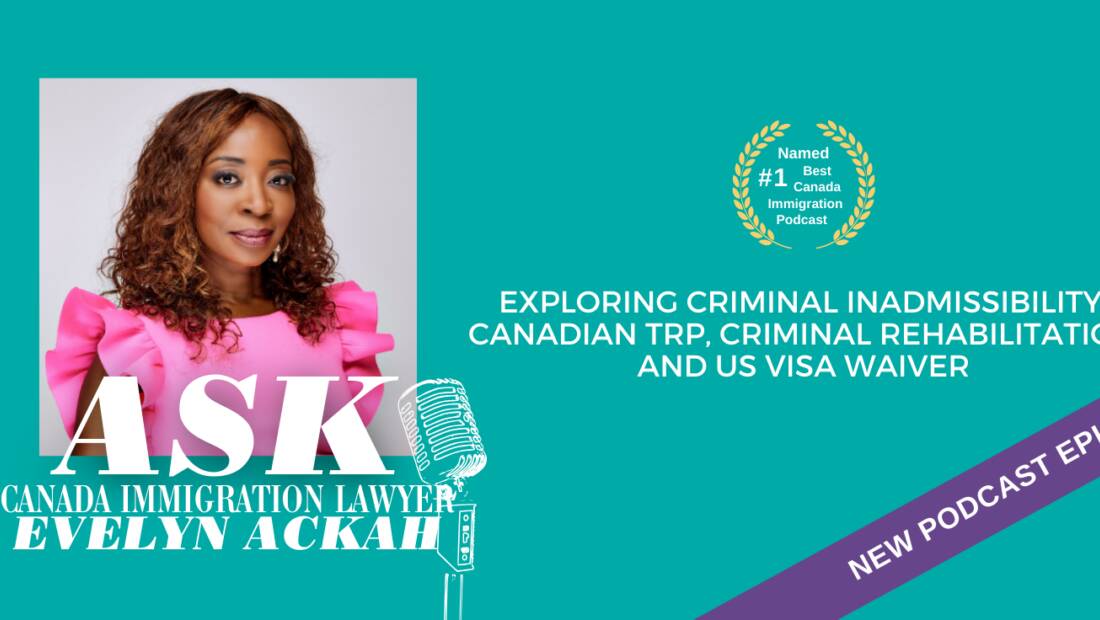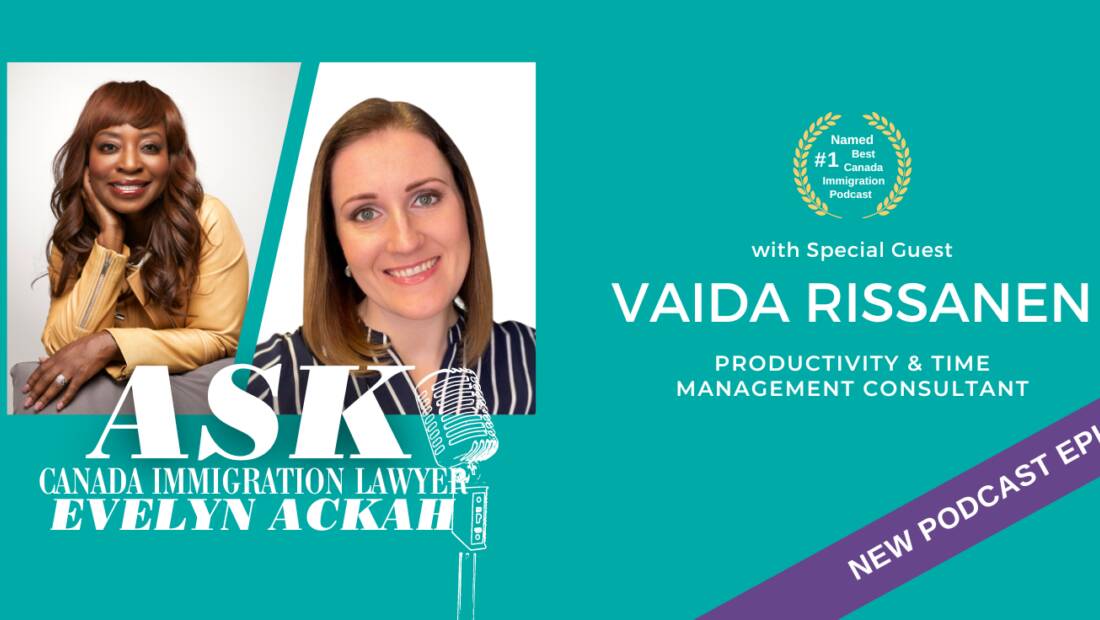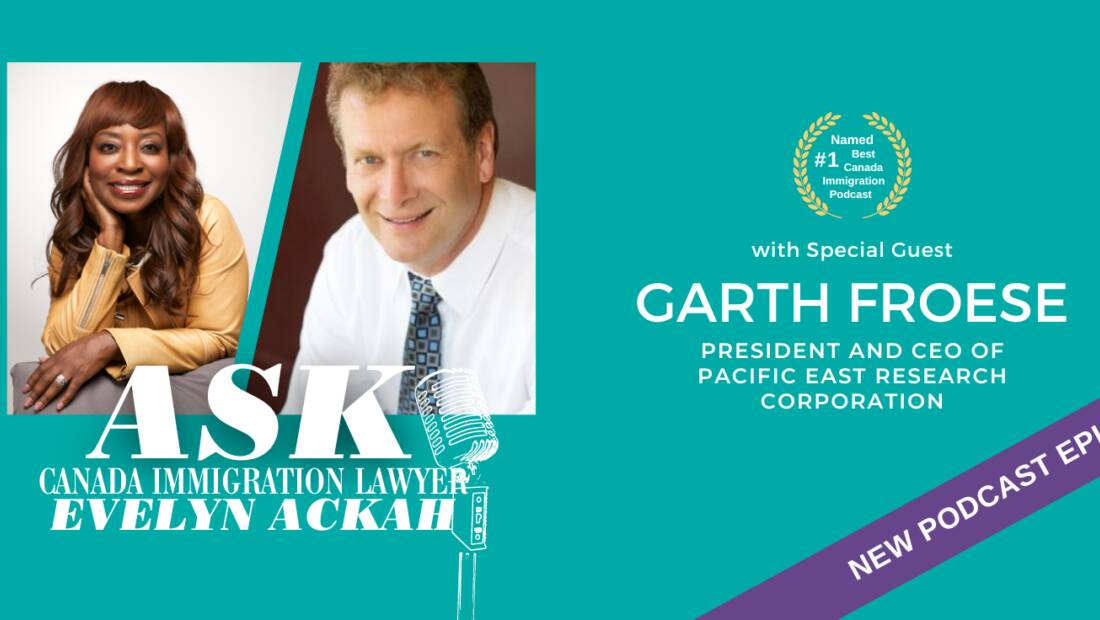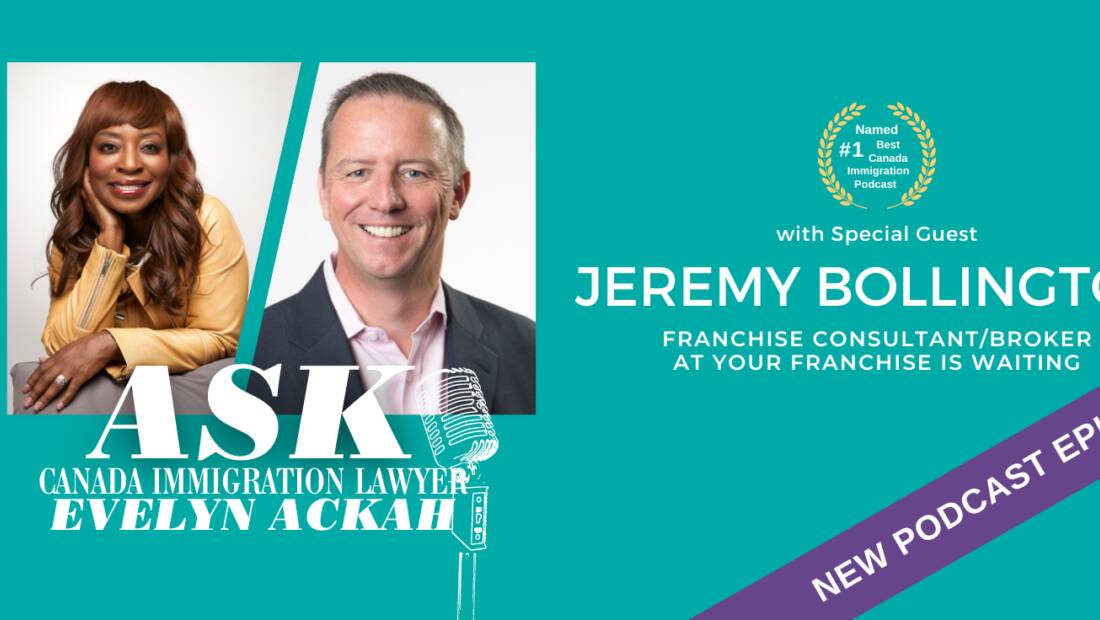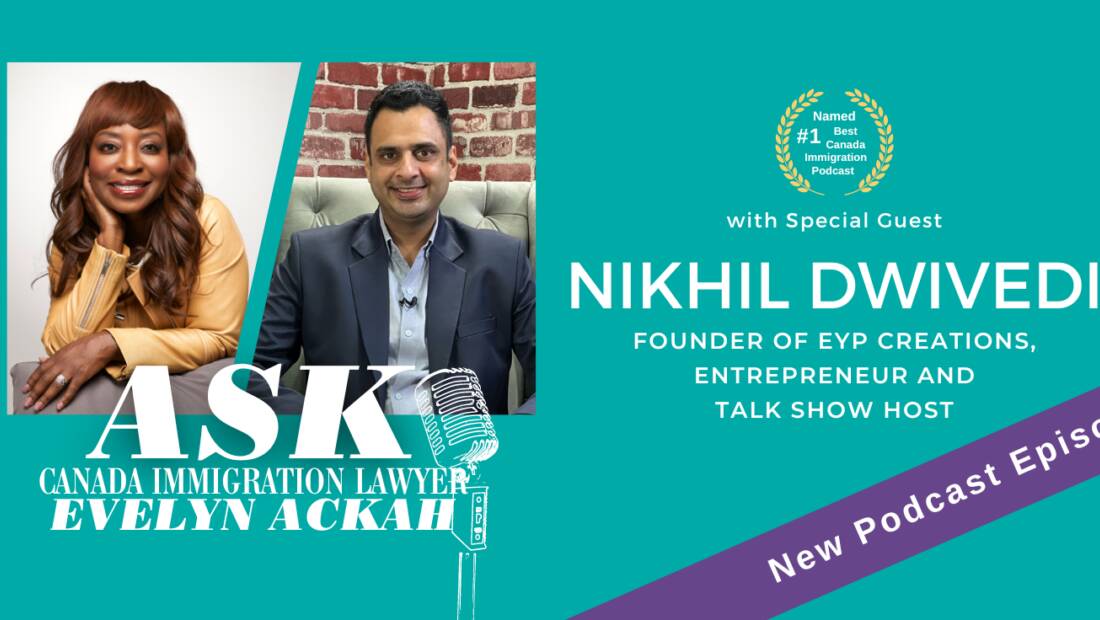Or listen on your favourite podcast app
On the Ask Canada Immigration Lawyer Evelyn Ackah Podcast, Canada business immigration lawyer Evelyn Ackah talks to American expat Marla Brock, the Founder and CEO of Kidcoover, Vancouver's leading resource for babysitters, nannies and au pairs and Canada's fastest-growing childcare agency.
Marla started the company while on maternity leave with her third child. She is a former lawyer and began her legal career in California's Silicon Valley, practiced law in Miami and later worked as a director of strategy at a publicly traded company in Vancouver. In life, I really believe that it's "not what you know, but what you do with what you know." Marla has also founded Cleancoover (an on-demand residential cleaning company), Carecoover (eldercare, home support and respite care) and Coover Immigration, (an immigration firm that specializes in the needs of foreign labourers).
DOWNLOAD OUR FREE EBOOK
HOW TO MOVE TO CANADA: A GUIDE FOR AMERICANS LOOKING NORTH
Work Permits for Home Caregivers in Canada
A live-in caregiver in Canada must be qualified to provide care for the elderly, disabled or children. They work in private homes and do not have direct supervision as they do their jobs. Contact us today at 403-452-9515 or email us directly.
As in so many other parts of the world, though, there is a high demand for workers of this kind, and it is not unusual for foreign workers to seek employment as live-in caregivers in all parts of Canada. To accommodate the demand for this huge labour pool, the LCP or Home Caregiver Program was created by Immigration, Refugees and Citizenship Canada (IRCC).
Learn More:
- New In-Home Caregiver Programs Open For Applications
- Live-in Caregiver Program Ending November 29, 2019
- Program Update: Open Work Permits Under the Interim Pathway for Caregivers
Ackah Law Can Help Your Canadian Dream Come True
For more information on immigration to Canada or the United States, contact Ackah Business Immigration today at (403) 452‑9515 or email us directly at contact@ackahlaw.com.

Transcript
Evelyn Ackah:
Good day. Thank you so much for joining me. My name is Evelyn Ackah, and I am the founder and managing lawyer of Ackah Business Immigration Law. I'm also the host of Ask Canadian Immigration Lawyer, Evelyn Ackah Podcast. And I have the pleasure today of having my friend and colleague, Marla Brock, joining me to talk about the caregiver program, her business, Coover Enterprises, I'm going to call it now, and Kidcoover. And talk about some of the changes with the caregiver program. Welcome, Marla.
Marla Brock:
Thank you, Evelyn. I'm always excited to talk to you and share thoughts, as we often do.
Evelyn Ackah:
Thank you. It's great to have you. I know your background, but I want to just give people some understanding of you are a lawyer in the United States. You worked in tech, and Silicon Valley, and in Florida, and then you found your way to Canada. You had the immigrant experience, your own, your own personal immigrant experience. How did you get to Canada?
Marla Brock:
I married in, which they say is one of the easiest ways. But I didn't really know it at the time. I met my husband down in Silicon Valley, where he was working. And so we lived and worked in Silicon Valley for a while. And then we moved to Miami, and slowly realized that that was not the best fit for him and we're more West coasters. He proposed that we give Vancouver a try, which I wasn't admittedly very excited about, but have since come to really love it. Having navigated the immigration process myself, I really have a lot of empathy for people that are coming in and understanding even transitioning from the United States to Canada is indeed a transition.
Evelyn Ackah:
It is definitely a transition. At Ackah Law, we do a lot of American-to-Canada intercompany transfers, and spousal sponsorships and all of that. It's just a really challenging thing, because your life is being uprooted and you're starting over.
Marla Brock:
Right.
Evelyn Ackah:
How did you move from that practicing law in the States, and then you were working as well in Vancouver, in a law firm before you decided to start your own business.
Marla Brock:
Yeah. I've always... My favorite part of practicing law was always the business side. And so I was always in corporate, and what I enjoyed was kind of getting into the guts of a company. And Evelyn, as you know, most of the times lawyers, we're drawn to the profession because we're maybe natural problem solvers.
Evelyn Ackah:
Yes.
Marla Brock:
We like to do things and find workarounds. And so, for me, I always loved that part of business. I came here, did a little bit of corporate law. I was a licensed practitioner of U.S. law here in Canada for a while. Then I went on in-house in a company as a director of strategy for business here, a publicly traded company. Then I went out on maternity leave with my daughter, and having experienced just the childcare scenario in Canada, just firsthand, even with kids and daycare, we had transitioned to a nanny.
Marla Brock:
And then when I realized, well, maybe I could maybe subcontract my nanny out during my maternity leave, quickly realized that everyone was grabbing for her. And so, being the fixer that I seem to enjoy being, I said, "Well, maybe there's a business idea here." It's been six years, actually, since we started Kidcoover. It was very organic. We started with friends that my nanny at the time knew, who were looking for part-time work, and then licensed as an agency. Then as you know, because I talked to you early on, just the process of getting people into the country and even moving them within Canada, if they're foreign workers, then I went back and just got certified as a consultant. But pretty much our business started out as being very naively, organic, thinking that we would just be moving in permanent residents and citizens around to family. But quickly realized that a lot of our caregiver population are foreign nationals. Since then, it's definitely been an interesting adventure, bobbing and weaving through all the changes that Immigration Canada presents to us.
Evelyn Ackah:
Never-ending changes. Never-ending changes. It is a challenge. As you know, I used to do a lot more caregiver, mostly for executives, and I just, even for myself, we have a nanny live-in as well. But honestly, I don't even think I would do the program anymore. Tell us about the changes now that have affected the caregiver program. Because now I think they're coming as permanent residents. It's a whole new world.
Marla Brock:
It is. It's a whole new world. I can understand the intent. Immigration Canada, in their efforts to ensure that when foreign nationals come into the country as caregivers, that we also recognize that they too are leaving families behind.
Evelyn Ackah:
Yes.
Marla Brock:
And so wanting to give those caregivers an opportunity to come into Canada with their spouse and or dependent children. So they made changes to the caregiver program in June of 2019, which turned it into an immediate... Well, I shouldn't say an immediate pathway. But they apply for permanent residency before they even come into the country.
Evelyn Ackah:
Wow.
Marla Brock:
Which is meant, as you know, as permanent residency, the application process is intense and it's a long processing time. That's what we're seeing our families and those that are hiring elderly caregivers, childcare givers, where they're now thrown into the thick of these processing times with Immigration Canada, that they never anticipated.
Evelyn Ackah:
And who can wait? Now, it's taking up to a year or something. Who can wait for that long when you have a kid that is now, you're about to go back on mat, finish your mat leave, or your paternity leave, and you don't have childcare lined up. I don't understand what people are supposed to do.
Marla Brock:
Yeah. That's one of the major challenges. I'm sure you can obviously appreciate everything that's involved in a permanent residency application, and it is absolutely necessary to have a thorough background check of someone that's coming into the country as a permanent resident.
Evelyn Ackah:
Yes.
Marla Brock:
Now, when they apply, or when they first rolled out the program, the initial timeline was 12 months, total processing time. And so the way that that was presented is that from the time the person submits their application to come into the country as a caregiver under one of the pilot programs, the entire processing should be 12 months. What they hinted is that within about four or five months, those caregivers would receive a work permit to come into the country. Which, as you know, when you're looking at timelines for embassies across the world, four months can be really short if you're bringing someone in from UAE or countries that have really long processing timelines at the embassy level.
Marla Brock:
The expectation of caregivers and families alike was that it could be very likely that that caregiver would be on Canadian soil within about four or five months. Now, this is all pre-COVID. We never saw that happen. Our first applications that we submitted in completion were in July of 2019. We never saw that earlier work permit come down the pipe at all. And then now the expectation has since been adjusted that the processing timeline for the person to come into the country is actually 12 months.
Evelyn Ackah:
Wow.
Marla Brock:
That was the processing time pre-pandemic. At the onset of the pandemic, what we started to see were... The timeline for someone to receive their AOR, acknowledgment of receipt, from Immigration Canada, went from about three to four months to about eight or nine months. And now I believe it's even longer. What I do with my crude math is I tack that onto what the original processing time was. When I'm talking to families, I do give them a very conservative estimate, so that they can plan their life and their childcare needs in the meantime.
Evelyn Ackah:
That means that they're basically having to get another caregiver, an interim caregiver, or a parent makes the decision to stay home until this whole process is finished. Because again, the kids need to be cared for. So you have to find some alternatives. Are you able, at Kidcoover, to provide Canadian-based caregiver support, like an interim gap coverage?
Marla Brock:
Yeah. We do have a very lengthy list of families that are in intern need. What we have been doing is encouraging to do what I call double-fisting. You have your custom order, perfect nanny, coming in from overseas that you're willing to wait for. Provided that, in the meantime, you have someone that's equally great, that can fill your immediate need. And so we are having some success with that. It does take time to find the right person. What we are having to do is actually pull them out... Well, not pull them out, but they're leaving other jobs elsewhere in the country. We're seeing a lot of movement actually from Quebec over into BC, from Quebec over into Ontario. We do recognize that it is a little bit challenging to get a caregiver from British Columbia to move East, especially during the winter months. But we have had some people go East, as far as New Brunswick, actually.
Evelyn Ackah:
Oh my goodness. At Kidcoover, it's not just Vancouver based now. Do you do across the country or how are you-
Marla Brock:
Yeah. I would say most of our open requests right now are in the Ontario area. I'm seeing a larger uptick in Victoria, surprisingly. I think in the last weeks we had three placements in Victoria, which is some area that we before didn't see much movement in. What I think is happening is that there is a large demand in Victoria for experienced elderly caregivers and nursing home attendants in light of the pandemic. And so I would suspect that maybe we're seeing some movement of people that would do childcare, are moving over into those higher intensely demanding professions right now. We started out again naively. We would be doing the little cottage industry in greater Vancouver. But, yeah, all across Canada.
Evelyn Ackah:
That's fabulous. I'm really happy to hear that. So it's not just Vancouver-based. Now it's across the country, and also you've expanded into elder care or caregiving, that's not watching children, right?
Marla Brock:
Right.
Evelyn Ackah:
That's another branch of your business.
Marla Brock:
Yes. That is probably taking a very large portion of our time. I would dare to say that that industry is much larger than childcare, because it includes not only those with elderly care, but we support families of children with special needs, high medical needs. We do take care of people that have recently been hospitalized that have required surgery or terminally ill and in some cases. Again, oftentimes we're looking at either the same labor pool or very similarly skilled labor pool.
Evelyn Ackah:
Yes.
Marla Brock:
Which is our supply. And as you know, with the border closures, and not just within Canada, but restrictions worldwide that are affecting travel, it's kind of choked our labor force coming into the country at a time we need it the most.
Evelyn Ackah:
What's the law now around moving people from one employer, they have the labor market impact assessment and work permit for them. Has there been a loosening of that requirement to go through the whole process again, even if they're in Canada, so that you can hopefully place somebody sooner?
Marla Brock:
Well, yes and no. I see a shift in the priority. For example, I just talked to a family this morning and I told them from start to finish, in terms of going through the process to hire someone that's already in the country, that's a foreign national, holding a valid work permit. I would say we could probably get it done, six or seven weeks. And here's why. There's the four week advertisement period, which hasn't been shortened. And then what I'm seeing in terms of a turnaround right now with Service Canada, one to two weeks, usually. If it's urgent, like we just had one that was done in three days by Service Canada, is taking care of an adult male with very high medical needs in the Ontario area. They were able to approve that LMIA within about three days.
Evelyn Ackah:
Great.
Marla Brock:
But normally for our clients, one to two weeks after the four week advertisement period has lapsed. And then, as you know, there's a new public policy where a worker that is on a closed work permit, that's changing to a new employer. They can have that application for the new work permit, prioritized. And Immigration Canada is committed to doing that within 10 days. I have found that to be true. Actually, it's more usually around the seven or eight day mark. Again, just adding things together. Four weeks, plus two weeks plus.
Evelyn Ackah:
That's so much better than it used to be. So much better.
Marla Brock:
Yeah.
Evelyn Ackah:
This, unfortunately for COVID, but it's definitely created some streamlining because they see the need for everybody to be able to work, and support their families and take care of their family members. I'm really happy to see that. Interesting to see what happens in the next year with all the changes and with the vaccine, if the business changes and the needs of the business go back to more childcare, or if everybody's taking their elderly parents out of care home.
Marla Brock:
Right.
Evelyn Ackah:
And wanted to just have them be cared for in the home. It's a really interesting trend. What's next for your business, your Coover Enterprises? You do cleaning, right?
Marla Brock:
Well...
Evelyn Ackah:
Well, you don't. Are you doing any or not because of COVID, you're not?
Marla Brock:
We were. And I think we may, well, actually, we are. We are moving back into that space. What we found is a lot of families, maybe they have children that are older, in high school, they don't necessarily need a nanny to take care of the children. But where they're losing time and where the pain spots are, are around the housekeeping. And so it's a little bit more than cleaning. Oftentimes, you need the house not only to be cleaned, but maybe to be tidied, and decluttered, and organized, or laundry is a big one. What we did with a cleaning business here in Vancouver, we often found that what really was left undone was all of the laundry and touches like that.
Marla Brock:
Or maybe sometimes when you come home from work and you don't mind doing your own cooking, but you would like maybe some vegetables cut up, so that you can quickly come in and do the things that you enjoy with your family. Spending the quality time. The approach that we'd like to take is really not necessarily housekeeping, but home keeping. So that when people they come home, and it feels like their own personal oasis, and it's the best part of their day. But you know that.
Evelyn Ackah:
I want that, Marla. I want it now.
Marla Brock:
I know. But we're talking about the same labor force here.
Evelyn Ackah:
That's the challenge. That's the challenge. How do you fill that need? Because as we know, Canadians are not doing, or wanting to do, or looking to do some of those things that help us, as busy working parents, do what we need to do. And I think there's a limit too, in terms of income that can be made, or how much people are willing to pay. There's this limitation of what you want, how you want it, to help supplement your life, and take care of your children, or just help keep the home so that it feels great when you walk in and there's not all these to-dos till 11-midnight when you get home. But then how do you account for the value of that? That's the challenge, I think, for every parent, every couple, every... Yeah. Interesting times. Well, I'm very much looking forward to seeing what's new for you in 2021. We have survived 2020.
Marla Brock:
I know. You and I talking when this first step started, just from being pulled from what our normal business lines were, to then the election down in the United States created additional interesting Canada. I know you've been bobbing and weaving as well.
Evelyn Ackah:
Yeah. It's a lot of pivoting. And also, I think it's great because at Kidcoover and with your organization, you've just pivoted. You figure out what people need. And I think you offered that to them in a way that makes it really easy. And that's what people want. They want to know that there's a lot of upfront work and screening being done to make sure that they get the right fit for their families. So it's the most important thing. I always say, I love my husband, but if I lost my caregiver, I would be in trouble. And so ...
Marla Brock:
Yes.
Evelyn Ackah:
I cannot lose my caregiver and have two kids. And you have three, and run a business, and employ people. And so, the one little note I just want to make, it's so interesting with COVID, how they were talking so much about how women have been pushed back into the home in a way that they may not have wanted or chosen. It's going to be interesting to see what it looks like next year or the year after, how many women return to the workforce after this time at home, that has been forced upon them because of COVID. What are your thoughts?
Marla Brock:
I have been sounding the alarm from the beginning, because we support a lot of essential workers, frontline workers, like double doctor families. They're also women that are working as professional engineers, lawyers. And when faced with the choice of keeping their kids home, maybe they need to keep them in a safer environment and not being able to find childcare. A lot of the time women will put their children first, of course, and put their family members first, or their elderly mother or father. My perspective has been that they need help.
Marla Brock:
They've asked for help. The people to support them, unfortunately are not in the country right now. And there's no way of getting them in quickly. And as I said too, our member of parliament, we're going to look back 10 years from now and wonder what on earth happened to all of the women in their professions. And so, as I've been screaming from the hilltops, like we must do something to keep women on track in this country. I can see daily. It's very frustrating for me, because I know if they had the help they needed, they would be able to continue to work and support their families on a full-time basis.
Evelyn Ackah:
I agree completely. Completely. And so, hopefully you are going to solve all the problems of the world and get these women the caregivers they need. And take care of the feminist movement. It's a big deal.
Marla Brock:
Am I still doing or pushing for. It's hard to watch.
Evelyn Ackah:
It is hard to watch. You must be talking to them all the time. I see it already, in my social group, and of professional women, but I'm also... I'm sure you must hear a lot of it. It's heartbreaking. They spend 12-15 years in university, and getting all your education, and your credentials, and your career developed, and because of this and the lack of national childcare or program for caregivers that is efficient, and fast, and expeditious, they're losing. They're being held back. I really do hope that we can get everybody back to work next year in a safe manner. And I hope that out of this will come some political changes around the caregiver program. It needs to be improved. And I'm with you on advocating for the changes. We need changes so we can keep doing what we do.
Marla Brock:
That's right.
Evelyn Ackah:
In the meantime, thank you so much, Marla. I really appreciate your time and your expertise. You are my go-to for caregiving. Because I don't do it unless it's for friends or for myself, it's becoming so complex. And I think you do need a specialist, like yourself, an immigration consultant that's regulated, that is running a recruitment business, that's doing everything right, that understands what's happening on the ground in all these countries to get the lay of the land and give people really practical, knowledgeable, knowledgeable advice. I thank you for joining me. And I look forward to next time, when we can talk about law, and our families, and all the rest of it in person one day soon.
Marla Brock:
That's right. Can't wait for that.
Evelyn Ackah:
Me too. Thank you so much. I appreciate you being on my podcast.
Marla Brock:
All right.
Evelyn Ackah:
You're the best.
Marla Brock:
Any time. Thanks, Evelyn. Take care over there.
Evelyn Ackah:
Thank you. Okay. Bye.

